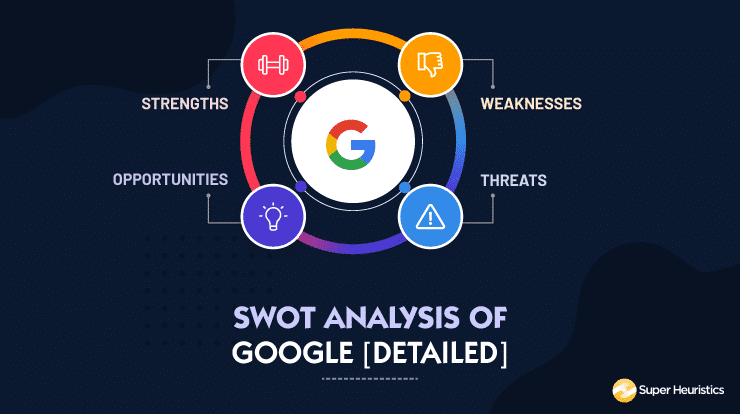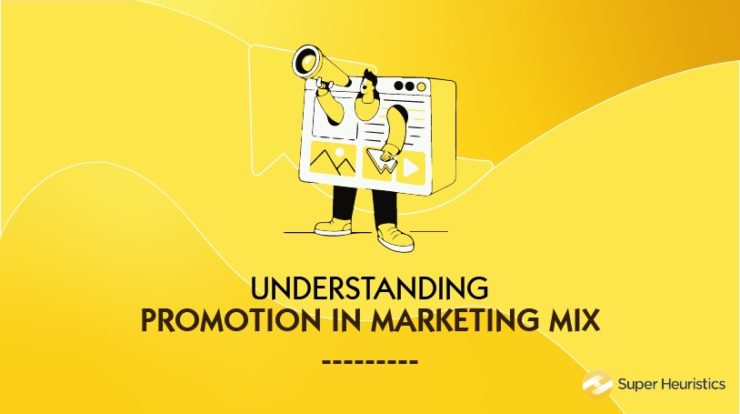
Google was founded in 1998 by Larry Page and Serge Brin in California, USA. This power-duo formed Google- technology company as a research project, while at Stanford University. Since then, the company has grown in leaps and bounds and became a tech giant in the mainstream media.
Can you believe in just some 20 odd years, Google has become a concrete part of people’s lives, across the entire globe! And now led by Mr. Sundar Pichai, as the CEO of Alphabet Inc.
And to analyze how Google rapidly grows, while addressing the competition from FAANG, I will be discussing the SWOT Analysis of Google.
(FYI: FAANG = Facebook, Amazon, Alphabet, Netflix, and Google)
Now what is SWOT Analysis? What can an MBA learn from it? Let’s see.
What is SWOT Analysis?
SWOT stands for Strengths, Weaknesses, Opportunities, and Threats.
Strengths and weaknesses are internal to your company—things that you have some control over and can change. For example, your product design, your security policy, patents, etc.
Opportunities and threats are external—things that are going on outside your company, in the larger market. You can take advantage of opportunities and protect against threats, but you can’t change them. Examples include competitors, prices of raw materials, and customer shopping trends.
How is it important for MBAs?
SWOT analysis is an important tool, especially for leaders and top-management. This arms you with a solid strategy for prioritizing your actions, for an aimed growth.
You might think that you know all about your company. But SWOT pushes you to review it from new angles and analyze new aspects.
But as a top-management, this will not be solely on you. You would have a team of people having varied perspectives. Starting from marketing to research to finance team, everyone can be there to share their perspectives.
Many companies even hire third-parties for own internal ranks, when they perform a SWOT analysis. This helps in getting input from customers, and adds their unique voice to the mix.
Now, we know why this analysis is important. It’s time to narrow our discussion to SWOT Analysis of Google.
SWOT Analysis of Tech-Giant: Google
One of the most coveted summer internships for B-school students is that of Google’s. And it’s an open secret that they tend to ask you about your view of their products. For example, which product is your favourite, which is least favourite? And why?
SWOT Analysis of Google can give you an uber-level idea about how their products contribute to Google. Even how they function and where does their pain-point lies.

Source: List of Google Products
If you are someone who wants to nail these questions, this article is for you! A thorough idea of their plethora of products and strategies, will definitely give you an edge.
And SWOT analysis of Google is your way to start!
Let’s jump into our SWOT analysis of Google. Let’s go over each of the four aspects: Strengths, Weaknesses, Opportunities, and Threats.
Here is the SWOT analysis of Google at a glance.

Now let’s analyze in a little bit more detail.
Strengths of Google
Google’s continuous growth over the years is attributable to numerous internal factors. These factors form the strengths of Google, and here I will be taking you through what are the strengths of Google briefly:
Pseudo-Monopoly
When it comes to searching something on internet, we have become used to clicking Google. It can be said that for most of us Google is synonym to internet!
Google processes more than 40,000 search queries per second on average, which is equivalent to about 3.5 billion searches per day!
Now some might argue that Google has used this pseudo-monopoly situation in its favour. And hence does not let anyone enter this search- engine market. But time and again, Google has said that for them people searching the internet are not Google's true customers.
We're its product. Advertisers are its real customers.
And if you see the graph below, you can see why is it difficult for any new/old player to compete with Google.
And to add to this, its dominance has hardly ever bothered its users. The company has historically ranked high in surveys of user trust.
Though recent growing public sensitivity about the loss of digital privacy and President Donald Trump's repeated and unfounded claims of tech industry bias, have left some dents in its reputation.
To know more about this, read: Economics Times: If Google's a monopoly, who is harmed by its market power?
Brand Valuation
It is one of the most valued-brand. According to Forbes, in“the world’s most valuable brand list,” Google is ranked at # 2 position after Apple.
- Google’s parent Alphabet’s market value currently sits at $1 trillion. And could go higher as Wall Street bets that the company will report another quarter of strong advertising sales.
- As for Google, it has a huge revenue of $161.86 Billion (2019). And Google has garnered this through advertisement, ensuring its growth along.
- For detailed Google revenue/ growth statistics: Google Search Statistics
Rapid Growth & Adaptibility
Taking about its growth, Google is one of the fastest-growing companies in the world. In 2001, the company had fewer than 300 employees; then it increased 10-fold to 3000 in 2004, it grew 10-fold again to 32,470 in 2011.
And by 2019, its employee- body was of 118,899.
Not just it terms of its employee, Google keeps adding new ideas/ apps to its list. Few of my favourites being ChromeCast, Google Analytics, Art and Culture, Google Earth, etc.
And few others which have become super-essential nowadays. For example, GPay, Chrome, Gmail, Maps, Google meet etc.
Google always keeps innovating and investing in new ideas. And probably this is why it even can compete with Apple’s products. We have always seen a good tussle between Apple vs Android!
Weaknesses of Google
Google has been a target for slams in the recent times especially. This is where I will show you why it gets slammed!
Dubious Privacy Policies
Google has been slammed by many experts for its excessive reliance on privacy, especially when it comes to hiding information about algorithms. The company has since taken steps to address the allegations.
But it doesn’t just end here.
Recently, Google was fined for breaching EU’s online privacy laws. It was one of the biggest fine imposed for such a breach. This case was not about the need for consent for personalised advertising, but about how exactly it should be obtained.
Over-dependence on Google Ads
Advertisement space is highly competitive, and rely heavily on macroeconomic conditions. Hence its risky to have it as a major source of income. Almost 84% of the revenue comes from this.
But I believe Google is aware of it, and is slowly transitioning into an healthy balance of revenue income.

Source: Statista
Failed Social media Entry
Before the emergence of social media giants like Facebook and Twitter, most people relied on Google to access the latest news digitally.
But now, you can access the latest news via other social media platforms. Unfortunately even Google News isn’t used for that purpose now!
To get in the game, Google has attempted to launch several social media platforms too. But Google Plus and Shoelace failed to gain traction and forced the company to shut it down.
Opportunities for Google
Some of the areas which can be opportunities for Google, are here:
Expansion in emerging markets
Because of this COVID, most of us have shifted to “WFH” aka work from home situation.
With Microsoft and Zoom making billions from its video calling services. Google is already making moves to exploit the demand for remote work solutions and recently added video-calling features and other collaboration tools in Gmail.
Same stance it took about online-payments, with GPay. Giving a good competition to other payment platforms like PayTM, PhonePe, WhatsApp. The scratch card offers was one of the clever tactics used by them, at the start of their entry.
Not just that. Google is taking up a notch its cloud-storage division.
They introduced a new digital store, which offers cloud-based softwares. Along with this, the company collaborated with MobileIron, Inc., to integrate its cloud Orbitera commerce platform with MobileIron’s app distribution, security, and analytics capabilities.
Google in India
Yes! You read it right. Google has identified India as its opportunity ground. Google will invest ₹75,000 crore, or approximately $10 billion, into India over the next 5–7 years.
It will be done through a mix of equity investments, partnerships, and operational, infrastructure and ecosystem investments. This is a reflection of their confidence in the future of India and its digital economy.
Do read Finshots: Why Google committed $10 Billion to India's Digital Future, to know more
Google Glasses and Other Innovations
The introduction of Google Glasses and Google Play promises to be a game changer for Google and this is a significant opportunity that the company can exploit.
“A hands-free device for smarter and faster hands-on work”
Indeed, this very aspect can make the company take the next evolutionary leap into the emerging world of nano-computing and operations.
Cloud Computing
Cloud Computing remains a key opportunity for Google as it is already experienced in providing storage and cloud solutions. Indeed, if not anything, it can move into the enterprise market using the cloud-computing paradigm.
And lastly, I am here to tell you about the threats for Google.
Threats for Google
If I ask you which company gives Google the toughest fight? Or is a threat for Google?
Most likely your answer would be Microsoft Bing, Yahoo?
But that’s not the way Google sees it!
FAANG Competition
Biggest search competitor for Google is -Amazon. The main area of competition for these two companies is product searches.
Forrester Research found that a third of online users started their product searches on Amazon, compared to 13 percent who started their search from a traditional search site.
ComScore found that product searches on Amazon have grown 73 percent over the last year, while shopping searches on Google have been flat.

Source: Amazon vs Google
Tussle with China
Google's first foray into Chinese markets was a short-lived experiment.
Google China’s search engine was launched in 2006 and abruptly pulled from mainland China in 2010 amid a major hack of the company and disputes over censorship of search results.
To re-enter the world’s biggest market, Google has to face a dilemma.
Will it compromise its principles and censor search the way China wants?
Another brilliant read on this topic: Google took on China- and lost.
So, did you see? Even a tech-giant like Google goes through continuous ups and downs. SWOT analysis of Google helps us to be aware of these.
Apart from these, some other factors are there too. Now, these might not be Google-killers, but may bring a balance to the search engine market!
Regional Search Engine Leaders
A search competitor like Baidu or Yandex (the market winners in China and Russia, respectively) might be dangerous for Google as their markets become more important players in the world economy.
They already have a huge population as their audience. With a combination of top-level tech-geeks and support from mainstream media, they might expand anytime. Defeating Google’s monopoly all at once.
Another threat is from us, the search engine users. I will tell you how!
Web Search Trend Transformation
As the web becomes increasingly large and complex, it's very possible that web surfing and web searching habits will evolve.
Brands like Expedia, Zillow, and iMedix are all competing in the arenas of vertical search, hoping that when web users think travel, real estate, or health care, they won't turn to Google, but instead will go directly to their favorite vertical engine.
For example, few years ago when you wanted to buy anything, you search Google/Amazon. But now suppose if I want to buy some cosmetics, I will go to Nykaa.
Amazon might be having the same product, but I choose Nykaa. Why is that so?
Because Nykaa solely belongs to the cosmetics and skin-care category (or vertical).
Conclusion
To conclude, I aimed at telling you a little about the importance of SWOT Analysis framework, at the start. And a little about the company too (Well, you must definitely Google that one on your own!)
Then we moved forward to discuss Google’s SWOT analysis in depth. Keeping its products, their contribution, its investments and plan for growth, in focus.
Hopefully, now you know a bit more about Google. And to find more SWOT of leading companies (especially Google’s competitors!), follow the links!








